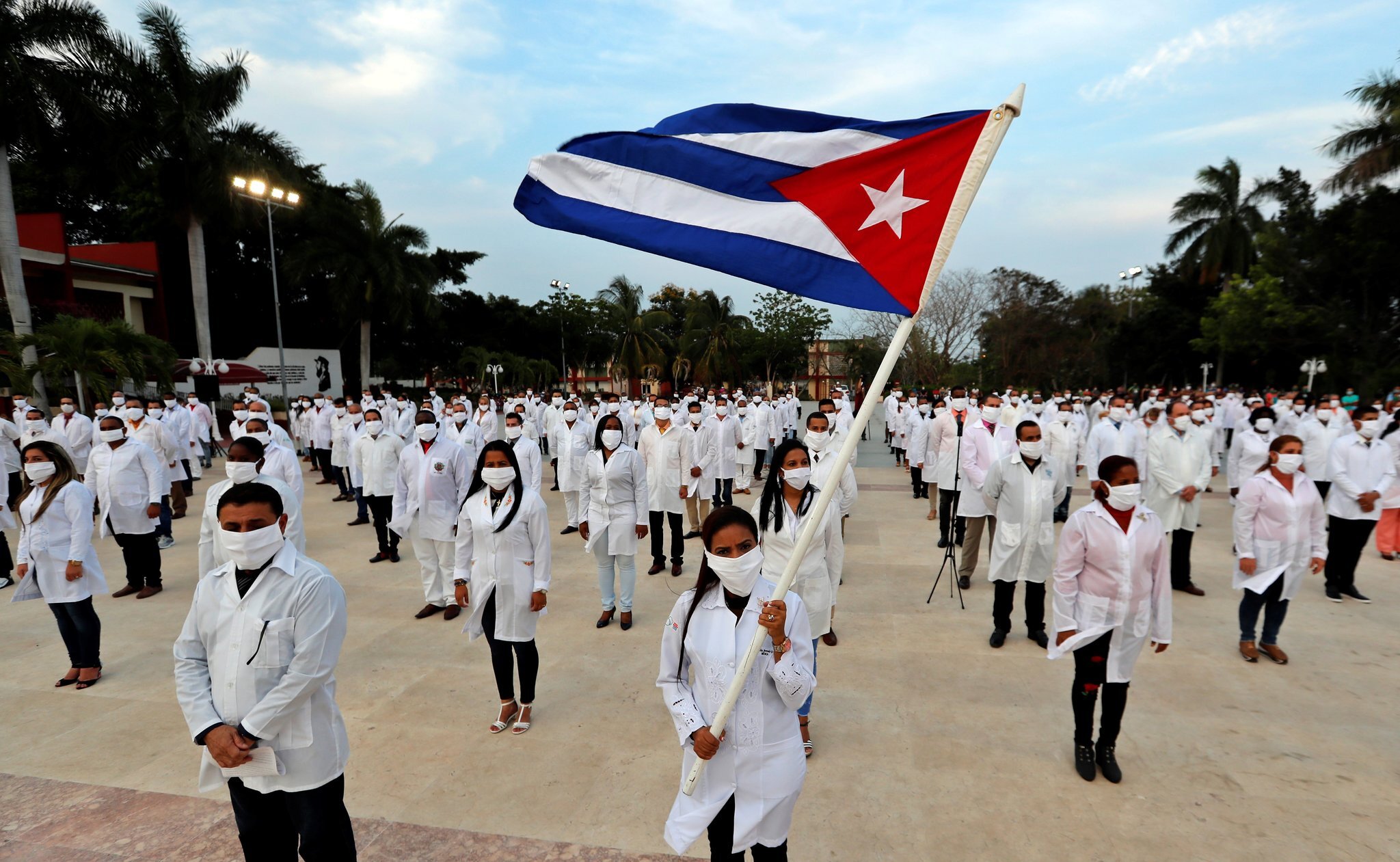Cuba Shows The World What Solidarity Looks Like
Cuba’s Henry Reeve International Medical Contingent has come to public attention recently with the arrival of Cuban medics in Northern Italy to assist the fight against the Covid-19 pandemic. This was the first time a Cuban medical team has travelled to assist a European country.
Cuba’s policy of providing international medical assistance goes back to the first year of the revolution in 1960. That year Cuba sent a team of medics to Chile after it was hit was a devastating earthquake. A few years later, Cuba sent doctors, nurses and dentists to help newly independent Algeria to create a new healthcare system. Ever since these early healthcare expeditions, Cuba has constantly improved the effectiveness and smoothness of its overseas medical operations.
Cuban medic treating a patient in Guinea-Bissau, West Africa in 1974
Over the past sixty years, over 400,000 Cuban medics have elected to serve in scores of countries, mostly in the Americas and Sub-Saharan Africa. It has sought to increase cooperation on a global South/South basis. Cuba offers medical assistance to anti-colonial movements and governments and even to impoverished communities living under hostile governments or insurgent groups.
Among the 1,667,250,000 cases seen to date by Cuban doctors working abroad, they have performed over twelve million surgical operations, delivered over three million babies, administered over fourteen million vaccinations and saved over six million lives.
The wealth of experience garnered from working in varied environments, friendly and hostile, has been brought together in the principles and practices of Cuba’s international cooperation program. Some of which are:
All overseas posts are voluntary.
Postings are primarily in remote and under-served areas for a minimum of two years.
Cuban medics offer low-cost or free services.
Prospective medics must study the language, history and culture of their host country.
Local cultures and customs must be respected.
Medics receive their salary plus a percentage top-up, plus vacations as per usual.
A Cuban medic visits a remote community in the Amazon.
Since 2004, Cuba has operated its Vision Restoration and Improvement Program. It aims to offer free surgical interventions for reversible eyesight conditions. To date, over three million people in Central and Latin America and Africa have been treated under this program.
The Latin American School of Medicine (ELAM) was founded in 1999 for the purpose of offering medical training to international students from disadvantaged backgrounds in Havana. It can facilitate many thousands of students annually. It embeds a completely different ethos into qualifying physicians whereas they are much more likely to remain living and working in the global South amongst poorer communities as opposed to migrating North to work in richer countries. By 2019, over 28,500 medical students, mostly from Central and Latin America, had graduated from the ELAM.
Cuba has provided more medical care across the global South than the G8 countries combined.
In 2005, Fidel Castro founded the Henry Reeve international Medical Contingent. It trains and equips medics for dispatch to post-disaster scenarios and to disease outbreaks around the world, usually within the global South. In most cases, costs are paid for by Cuba.
Cuba also offers a professional service to provide medics, including GPs and specialists, to health institutions in another example of South to South cooperation. With its varied health programs, Cuba is able to act quickly, rapidly deploying medics to the scene of an emergency. Throughout the global South, Cuba very often has feet already on the ground, along with a network of local postgraduates from ELAM colleges.
Cuban medics in Brazil 2013
Cuba aims to bring the benefits of low-cost or free universal healthcare to impoverished and disadvantaged people across the world. At the same time, it earns much need foreign currency to help fund its own healthcare system. Medics working abroad know that a substantial portion of their host countries reimbursements go towards funding family and community health services back in Cuba.
Fidel Castro gave a speech on the occasion of the foundation of the Henry Reeve Medical Contingent on September 21st ,2005. He ended his speech with this summary of its ethos and purpose -
“It is necessary to train the doctors needed in the countryside, in the villages, in the poor and marginalized neighbourhoods of Third World cities. Even in extremely rich countries like the United States, tens of millions of Afro-Americans, Indians, Latin American immigrants, Haitians and many others have no healthcare programs or medical care.
We are offering to train professionals who are prepared to struggle against death. We shall prove that there is a solution to many of the planet’s tragedies. We are proving that man can and must better himself. We are proving the value of conscience and ethics. We are offering life.”
Cuban medics in Havana before flying to South Africa to assist in the fight against Covid-19.






